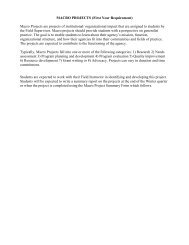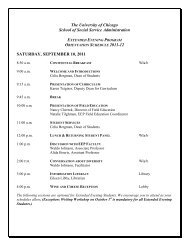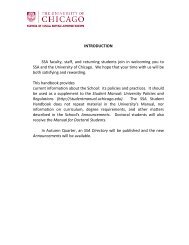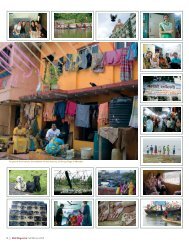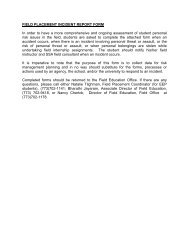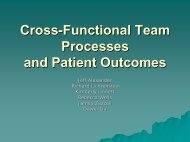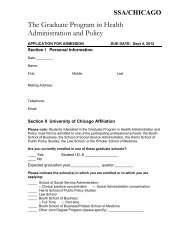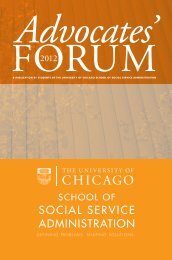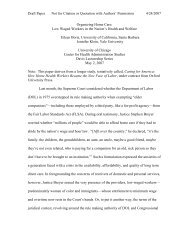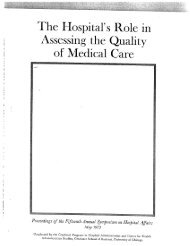2004 - School of Social Service Administration - University of Chicago
2004 - School of Social Service Administration - University of Chicago
2004 - School of Social Service Administration - University of Chicago
Create successful ePaper yourself
Turn your PDF publications into a flip-book with our unique Google optimized e-Paper software.
CULTURAL COMPETENCY<br />
with mental illness vary from culture to culture, and their weight affects<br />
whether or not a person will seek any sort <strong>of</strong> treatment in the first place<br />
(Takeuchi and Kim, 2000).<br />
In providing mental health care for culturally diverse elderly clients, pr<strong>of</strong>essionals<br />
and service providers must be aware not only <strong>of</strong> the role that culture<br />
plays in conceptualizing mental health and mental disorders, but must also be<br />
knowledgeable concerning the wide-ranging effects <strong>of</strong> culture in shaping<br />
beliefs and values about aging. Simon Dein and Sarah Huline-Dickens (1997)<br />
propose that in every society, different rights, duties, expectations, and privileges<br />
are associated with reaching old age. These rights and privileges may<br />
be enforced both through formal laws and informal social sanctions. So too,<br />
old age is culturally defined, and varying definitions may take into account<br />
physical and social functioning, as well as chronological age.<br />
Dein and Huline-Dickens (1997) also point out that there has been relatively<br />
little cross-cultural research examining which aspects <strong>of</strong> aging are universal<br />
(and thus unavoidable) and which aspects are culturally defined (and<br />
therefore not an inevitable part <strong>of</strong> the aging process). According to Dein and<br />
Huline-Dickens (1997), there is no empirical support for the notion that social<br />
disengagement among elderly people is an inescapable, universal phenomenon.<br />
Disengagement may be relatively widespread among elderly people in Western<br />
cultures and may be intensified by the Western emphasis on the connection<br />
between a person’s social worth and productivity. However, this is not true in<br />
every society (Dein and Huline-Dickens, 1997). The Sherbro people <strong>of</strong> Sierra<br />
Leone, for example, interpret incoherent speech in old age as the elderly<br />
person’s communications with revered ancestors and, thus, associate elderly<br />
status with wisdom and good fortune (Palmer, 1997).<br />
In any assessment <strong>of</strong> the influence <strong>of</strong> culture on perceptions <strong>of</strong> aging, it is<br />
also important to consider the role <strong>of</strong> religion. Religious values strongly influence<br />
beliefs about death and the extent to which death is feared. Such beliefs<br />
<strong>of</strong>ten serve as a source <strong>of</strong> comfort for elderly people who are dealing with loss<br />
and grief (Dein and Huline-Dickens, 1997). In certain religious traditions,<br />
such as Taoism and Confucianism, being elderly is associated with wisdom,<br />
honor, and mastery (Palmer, 1997).<br />
WHAT DOES IT MEAN TO<br />
BE CULTURALLY COMPETENT<br />
In the context <strong>of</strong> mental health care for elderly people, cultural competence<br />
refers to integrating an understanding and awareness <strong>of</strong> the client’s culture into<br />
all aspects <strong>of</strong> service delivery, including assessment and diagnosis, treatment<br />
33




